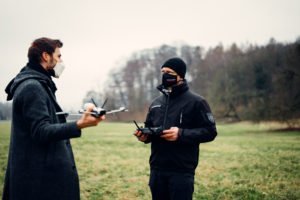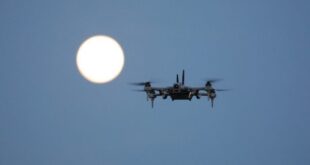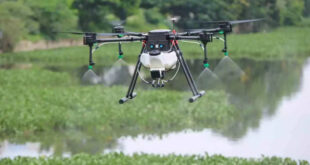Romeo Durscher brings his years of passion for using drones to save lives and improve communities to the Auterion team. It’s a new start that brings value and satisfaction for both Durscher and Auterion: and signifies a shifting environment in the drone industry.
“One of the drone industry’s top executives and a highly experienced leader in aerospace and unmanned aerial systems, Romeo joins Auterion from DJI, where he held the role of Senior Director of Public Safety Integration,” says the company announcement. “During Romeo’s six years at DJI he built the Public Safety vertical and through his leadership and drive to bring new technologies to emergency services, he has become a well known and respected thought leader in the space. Prior to joining DJI, Romeo spent twelve years working on NASA’s Heliophysics Mission Solar Dynamics Observatory at Stanford University.”
“We are thrilled to have Romeo join our senior team as Auterion experiences significant growth, while we continue to deliver product innovation to customers across multiple verticals and use cases” said Lorenz Meier, co-founder and CEO of Auterion. “We are transforming the drone industry with an open-source ecosystem, and with Romeo’s extensive expertise and thought leadership in public safety and the drone industry we can meet the very customized need of first responders with cutting-edge drone systems like the Astro so they can work more efficiently.”
 DRONELIFE was honored to speak with Romeo Durscher, one of the smartest – and nicest – figures in the industry today, to get his thoughts on his latest move and the place of open source platforms in the drone space.
DRONELIFE was honored to speak with Romeo Durscher, one of the smartest – and nicest – figures in the industry today, to get his thoughts on his latest move and the place of open source platforms in the drone space.
As one of the first thought leaders in the industry on drones in public safety, Romeo Durscher has held a major role in developing products for police and fire departments, getting to know the individuals working in the space and spending time out in the field: from volunteering for disaster response missions after California wildfires to training in classrooms. Now, Durscher sees the growth of Auterion’s open source solutions as a step that will help the public safety sector to move forward in adopting drone technology.
“Open-source has become one of those tech terms we hear a lot and people may also associate certain promises or ideals to it,” he explains. “When I first heard the term “open source”, I was imagining hundreds of individual developers sitting in their basements at home, writing code and sharing their creation out of their own goodwill.”
“While this is the basic concept, in enterprise it’s an R&D process: developers working for companies, being tasked with creating software solutions,” says Durscher. “These may be small teams working with other small teams at other companies, and because of this open collaboration, progress is made faster, solutions are scalable faster, and the ecosystem can focus on creating additional needed solutions; in both software and hardware.”
Public safety departments of any size have limited time and resources to devote to learning complex new technologies. Recent political issues have made it difficult for departments to chose platforms that will meet the requirements of all of their stakeholders. Solving these problems can help speed the adoption of drone tech.
“What is driving future growth are open-standards. Instead of one company creating a standard, by pushing their own proprietary solution, the community, and the industry, are working together on open-standards,” Durscher explains. “This allows solutions to be built towards those standards; for example a drone operator only has to learn one user interface, and that operator can utilize one device to control different manufacturer’s drones. This means learning and training is simplified, standardized and actual deployment is more efficient. This results in end users having greater choice with platforms using the open-standard.
While public safety programs are one of the sectors that can benefit, Durscher says that open source standards and platforms are helping the entire industry to evolve faster. “We don’t know what we don’t know,” says Durscher. “It sounds so very logical, but what it means is that the entire drone industry is still very young. We have learned many lessons: but there remain many unknowns.”
“We have learned a lot about how drones are being used, how they are being integrated and deployed, and we have seen many solutions come to life because of that knowledge. But we don’t know what the future industry needs; and what we are building today becomes the building block for the future.
That’s the beauty of building an open-source community. We at Auterion enable talented people worldwide to collaborate and create full-scale solutions that are reusable and standardised to address global challenges. Together, this ecosystem has more development power and skill than any well-resourced company in the industry.”
“In my previous position I was forced to think short-term; the focus was always on the current or maybe the next quarter,” he says. “Many solutions take time to be understood, realized and then implemented. One has to find the perfect mix with ensuring quick impact, mid to long term success, viability and return. I am excited that at Auterion we can think not only about today, but next month and next year; really set-up solutions for the long term. I can continue to listen to customers, find and help develop possible solutions for them. I can do this better at Auterion because I am not limited to what one company can do, but can work with an ecosystem of companies to create the best solutions together. “
“For me, joining Auterion is something I had really wanted for a long time. We are within a global community of more than 10,000 developers and 750 contributors that drive the definition of standards, and believe in transparency and knowledge sharing,” he says. “I thrive on that concept.”
Miriam McNabb is the Editor-in-Chief of DRONELIFE and CEO of JobForDrones, a professional drone services marketplace, and a fascinated observer of the emerging drone industry and the regulatory environment for drones. Miriam has penned over 3,000 articles focused on the commercial drone space and is an international speaker and recognized figure in the industry. Miriam has a degree from the University of Chicago and over 20 years of experience in high tech sales and marketing for new technologies.
For drone industry consulting or writing, Email Miriam.
TWITTER:@spaldingbarker
Subscribe to DroneLife here.
https://dronelife.com/2021/01/12/former-dji-exec-romeo-durscher-joins-open-source-drone-software-platform-powerhouse-auterion/
 Unmanned Aerial Vehicle The latest drone news
Unmanned Aerial Vehicle The latest drone news




